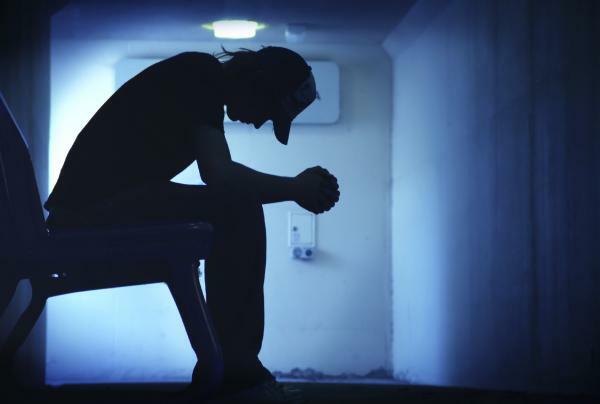
Are you very sleepy but can't sleep? There are many people who have extensive difficulties sleeping and in this Psychology-Online article we will not only see some of them, but we will also answer the question of what if you don't sleep one night or if you have any of these trouble sleeping. We will look at the hours of sleep required based on age, the types of sleep disorders that can cause you to not sleep, and the top 10 consequences of lack of sleep.
Do you know how many hours you should sleep? The optimal time you need to rest for your body and mind to function? To have a healthy life we must sleep certain hours a day. Depending on age, and taking into account that it is an approximation, we should sleep the following number of hours:
- 0-3 months: 14-17 hours
- 4-11 months: 12-15 hours
- 1-2 years: 11-14 hours
- 3-5 years: 10-13 hours
- 6-13 years: 9-11 hours.
- 14-17 years: 8-10 hours
- 18-64 years: 7-9 hours
- Over 65 years: 7-8 hours.
Why don't you sleep the indicated hours? One of the causes is suffering from a sleep disorder. There are multiple disorders related to sleep, the best known of which is insomnia, which we will address later. However, there are many other problems that often go unnoticed. Among them, we find:
- Insomnia and its types.
- Respiratory disorders: primary central apnea, Cheyne Stokes respiratory pattern, obstructive sleep apnea syndrome, central alveolar hypoventilation and congenital alveolar hypoventilation.
- Hypersomnia: narcolepsy with cataplexy, recurrent hypersomnia, idiopathic hypersomnia with prolonged sleep, hypersomnia idiopathic no prolonged sleep, behavior-induced insufficient sleep and other types of hypersomnia
- Circadian rhythm disturbances: delayed sleep phase syndrome, early sleep phase syndrome, irregular sleep-wake rhythm, free sleep-wake rhythm, Jet lag, alteration of the night worker, and alterations of the circadian rhythm due to a medical process.
- Parasomnias: confusional awakening, somnambulism, night terrors, conduct disorder REM sleep, isolated sleep paralysis, nightmares ...
- Abnormal movements: restless legs syndrome, periodic leg movements, night cramps, bruxism, rhythmic movements during sleep.
- Isolated symptoms: snoring, somniloquies, sleep myoclonus, benign myoclonus in childhood ...
Do you want to sleep but you can't? Why can't you sleep at night? You may have insomnia. Next we will see their types, causes and manifestations:
- Acute insomnia. The duration is less than three months and occurs when a stressful event has occurred that prevents the person from sleeping due to the state of worry, sadness, or anger where it can be found. In this article you will find more information about the causes and treatment of insomnia.
- Psychophysiological insomnia. Difficulty sleeping or easy to wake up due to high mental activity having great difficulty reducing said hyperactivity. The person, however, may fall asleep when he does not intend to do so and is performing monotonous or quiet tasks that make him sleepy.
- Paradoxical insomnia. The person reports having insomnia and barely sleeping. However, sleep studies do not show such symptoms.
- Idiopathic insomnia. Chronic insomnia of which the origin and reason for its maintenance are unknown. It appears from childhood or adolescence.
- Insomnia due to mental disorders. Insomnia that lasts at least a month and arises as a result of another disorder. In this article we talk about insomnia from anxiety.
- Insomnia due to poor sleep hygiene. Insomnia caused by bad habits of the person such as excessive caffeine intake, naps, being very active in the hours before time to sleep, heavy meals, use of the bed for other activities that are not related to rest (watching television, reading ...).
- Insomnia due to drugs or toxins: as a side effect to them.
- Insomnia due to medical problems: as a symptom of a problem of organic origin.
Next, we will address the most common consequences of not being able to sleep for one reason or another.
1. Daytime fatigue
This is the main consequence of not sleeping. The person feels constantly tired and may even fall asleep at some moments throughout the day due to his fatigue. In this article we talk about the causes and possible solutions of fatigue.
2. Irritability
Not sleeping causes an irritable state in which the person overreacts to different stimuli throughout the day. That is, they get angry more easily and that angry state of mind remains throughout the day.
3. Lack of attention
Lack of rest directly affects one of the most basic functions of our brain: attention. People who have not slept well have a much more difficult time staying focused on a conversation or an activity. This, in turn, can cause memory problems since we have not paid the required attention to a situation, it cannot be stored in our memory.
4. Stress
Lack of sleep is a very common cause of stress. In addition to a feeling of stress on a psychological level, the consequences of it on a physical level can also develop (heart problems, tension, among others). In this article we explain how to reduce stress.
5. Depression
Among the consequences of not sleeping we find a worse mood, since the mood is directly influenced by rest. It is common to feel more depressed. In addition, prolonged insomnia can lead to long-term depression. In this article you will find more information about depression.
6. Labor problems
One of the effects of lack of sleep is poorer job performance. In addition to making more mistakes at work, the probability of suffering an accident at work increases. This can lead to serious problems, not only with co-workers, but can lead to the loss of the position.
7. Delayed reaction
Another symptom of lack of sleep is a slow reaction. It is usual that, if you have not rested well, the ability to react to stimuli is affected. This has serious consequences such as traffic accidents.
8. Hallucinations
Lack of sleep can cause a level of exhaustion in the brain that causes it to stop distinguishing fact from fiction. People who are not there can be seen or heard due to the high level of fatigue of the person.
9. Impulsiveness
Another psychological consequence of lack of sleep is impulsivity. Here you can see what is impulsivity in psychology. Due to the inability to reason due to fatigue, decisions become faster, more impulsive, since our brain decides not to spend too much energy in making decisions. This impulsiveness can lead us to make many mistakes in our day to day life.
10. Metabolism
The body needs energy and, by not obtaining it from rest, by way of compensation accelerates the metabolism in a way that damages it and food is not metabolized or absorbed in a way adequate.
In this article we explain tricks to sleep fast.
This article is merely informative, in Psychology-Online we do not have the power to make a diagnosis or recommend a treatment. We invite you to go to a psychologist to treat your particular case.


